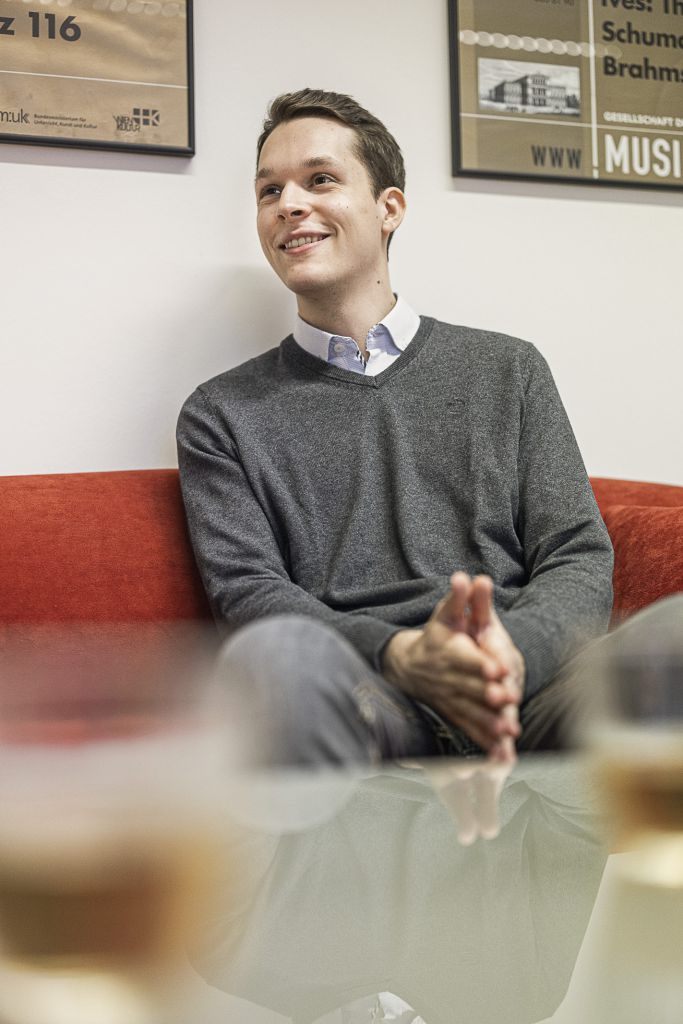A concert format and an outstanding young pianist: What do they have in common? They’re looking for connection— with the audience.
Soirée musicale
In November, the mdw invited the public to the Ehrbar Saal for a musical soirée: this variety-packed musical evening, led by conductor Vasily Valitov, featured the Webern Sinfonietta and Lukas Sternath. It was important to the University that this orchestral concert be opened up to the neighbourhood and made accessible in every respect. Admission was therefore free, and the neighbourhood’s people and institutions were actively invited to attend. On the evening of the concert, an introductory “Music Talk” and an appealing programme booklet offered complimentary ways of approaching the musical programme. And in the end, the concert was enthusiastically received in the packed hall.
Lukas Sternath
Looking back upon this concert, the young pianist Lukas Sternath spoke about the significance of connection, perfectionism, and going one’s own way.

Lukas Sternath (LS): The Soirée musicale was a special experience for me since the orchestra included some very close friends of mine, which was something new and extremely gratifying. I also really appreciate the effort that was made, which I think is very important—and I, too, enjoy trying out new things and formats.
Those close friends, namely Maxim Tzekov and Ulrich Manafi, are regular chamber music partners of yours—like in Ensemble Spielraum with Theresa Strasser, where you also develop your own creative concepts.
LS: Yeah, we try out various things. Our last programme focussed on French composers. We spent hours upon hours searching through libraries for suitable texts and letters, which we then used to present the music in its historical context. That hopefully gives rise to a stronger feeling of connectedness and enables the listeners to dive deeper into the music. We want to bring people together with music on multiple levels, and there are such great ways to do that, such great formats—so I want to try stuff out.
The crucial thing for me, in any case, is a strong connection with the audience. And it’s not a one-way street: in a successful concert, lots of things run in both directions, and that also goes for the traditional concert format. After all, it really is fascinating when 2,000 people come together and it’s simply … quiet. I wouldn’t want to give that up. But variety is great.
Is it also important to you as a musician to know a lot about the works you play?
LS: It’s less about book-knowledge, but knowing the music itself is very important to me. I start studying a piece by just reading it, over and over. And actually playing it is then more like an initial transcription. In doing so, I try to explore how the musical text is to be understood—to release the musical idea from its cage, so to speak. This kind of exploration does remain subjective, of course, and one can also deviate from it later on. But I think it’s not enough to just say “I feel it this way” beforehand. And there’s also the fact that you need to have trust. And to find your own way.
I’m a huge perfectionist by nature, but I do try to set that aside. Perfectionism is something you do somehow need, but too much of any one thing is always bad. You have to keep it in balance with spontaneity. Otherwise, you’re no longer authentic—and that kills the connection.
The ARD Competition was a huge success. What’s changed for you since then?
LS: Everything! (laughs) I now have an agency contract. And for the first time, I’ll be playing the same programme in fifteen different places. But even so, I’m still going to spend the next few years working hard at my studies. I’ve got lots of time and space yet to try things out and keep developing.
What have been some other important learning experiences in your artistic development?
LS: I haven’t had any particular “Aha! moment” that showed me my calling. My development’s been very organic. And I never made a conscious decision to become a musician—one thing just always led to the next.
I’m told that I’d already been very fascinated with a little keyboard as a small child. But classical music wasn’t what I started with: after my initial EMP courses, I refused to take classical piano lessons. I did like to improvise, though. And luckily, I had great teachers who let me do that. It was with the Vienna Boys’ Choir that I finally came into close contact with classical repertoire. And while attending a secondary school with a music specialisation, I took lessons from Alma Sauer in the mdw’s Programme for Gifted Children followed by regular lessons with Anna Malikova later on.
An important point in my development was, of course, my encounter with Igor Levit. We first met at a concert of the “Moments Musicaux” series at the Konzerthaus, and I now study with him in Hannover. In our work together, I have the confidence to really go out on a limb. It’s a very respectful relationship, with lots of freedom.
What would be some upcoming projects that are important to you?
LS: In Vienna, I’ll soon be playing my first recital at the Musikverein, after which I solo in Beethoven’s Triple Concerto at the Konzerthaus.
Event Tips:
Triple Concerto with Lukas Sternath
Konzerthaus, 10 March, 7:00 p.m. & 12 March 2023, 7:30 p.m.
Webern Sinfonietta: Die Schöpfung
Schlosstheater Schönbrunn, 18 & 20 March 2023, 7:30 p.m.

